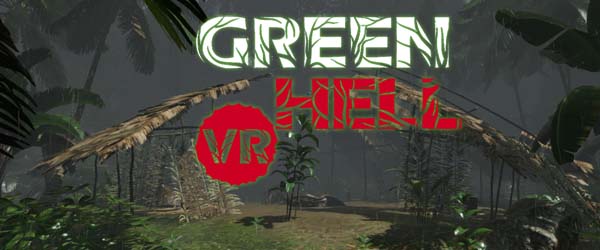
I always have mixed / complicated feelings about survival games. They always seem like a great idea in principle, and I feel like I would really enjoy them for their methodical gameplay oriented around problem-solving (which is one of the reasons I also love classic survival horror games). But when I actually play them, they are often annoying and frustrating, and I have a miserable time trying to learn how the game works.
I think a big part of the problem is that a lot of these games, being modest indie titles, don't have robust tutorials and aren't very good at communicating their gameplay mechanics to the player in an efficient manner. Even when they have tutorials, those tutorials feel like they barely scratch the surface of what the player needs to know. And then you're shoved out into the deep end, having to learn the rules of the game world and the controls for navigating it, while your precious food, water, and energy meters are all depleting. These games are insanely difficult in the early sessions because every new threat or challenge feels like an unfair "gotcha!" from the developers. Once I learn the systems (through lots of frustrating trial-and-error), I find that everything I need is readily available, and most of the fun and challenge of the game gets optimized away, leaving only the tedious chores.
Case in point, figuring out how to save the game in my first couple play sessions with Green Hell VR was a very aggravating experience. I don't recall the game ever telling me that saving requires building certain types of shelters. I assumed the game would autosave every time I slept, and possibly also every in-game day, or every 20 or 30 real-world minutes. So imagine my surprise when I slept, closed the game, and booted it up the next day to find that none of my progress from the previous session had been saved. No, sleeping in just any bed isn't enough to save the game in Green Hell. You need to craft one of 2 or 3 specific shelters, or at a specific landmark.
Saving the game can only be done at dedicated checkpoints, or at a crafted shelter.
Initially, crafting these shelters feels like a relatively daunting task. You need large sticks and palm leaves, both of which are too large and bulky to be stored in your backpack. Scavenging around for them can be time-consuming. They always seem to be everywhere as I'm walking through the jungle, but then nowhere to be found when I try to set up camp. It took me a while to figure out that I could get large sticks by cutting down certain trees, and that palm leaves could be easily cut off of palm trees. I was initially hesitant to use my sharp stones or basic axe to try cutting down these trees because the durability of these tools is so low. So I would wander around looking for loose logs and palm fronds to carry back to camp, all while my health and energy are slowly draining. Logs and leaves were the bane of my existence in the first few play sessions!
I don't have a problem with limiting the ability to save, nor do I have a problem with tying the save functionality to a resource. I've praised Resident Evil for doing those very same things. But Resident Evil at least very clearly explains how saving works, and gives the player an opportunity to save your progress right at the start of the game. The typewriter and an Ink Ribbon are right there in the first room of the game. Green Hell, on the other hand, requires playing through to a particular milestone before you find the first save point, which (depending on how you play) might be hours into the game.
[More]
6f7c7474-ac4b-410e-a7cc-4f2d0c7888d5|0|.0
Tags:Green Hell, Green Hell VR, VR, PSVR2, survival, jungle, Meta Quest 2, protein, carbs, fat, water, fire, animals, mushroom, hunt, crafting, amnesia, medicine, vaccine, anti-vaxxer
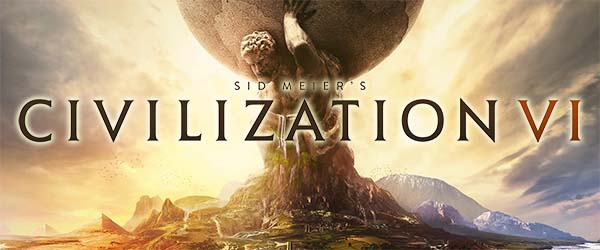
Civilization VI may look very similar to Civilization V at a glance, but once you start playing it, you're going to notice a lot of subtle differences. One of the most immediate differences will be the changes to unit-movement rules with respect to terrain. Units still travel on hexes, and terrain such as hills and forests still slow down movement, just as in the previous game. But this time around, the cost to enter a tile must be paid before entering that tile! This is a small, but significant change of rules that may force you to change the way that you explore the map.
The rewards of exploration are many, and finding these rewards is key to a good start.
Efficient exploration is key to getting off to a good start in Civilization. And a good start is key to success at higher difficulties and in competitive multiplayer. This is still true in Civilization VI. First and foremost, exploration will reveal valuable real estate for settling your first few cities, including resources, coast lines, and natural wonders. An efficient explorer will also be likely to uncover more tribal villages (i.e. "goody huts"), which will grant tech boosts, extra money, free units, or a head start towards founding your own pantheon. Efficient exploring will also introduce you to more city states, and you'll be more likely to be the first player to meet the city state. Being first to meet a city state will grant you a free envoy. This will grant you an immediate bonus depending on the type of city state, and it will put you one step closer to unlocking additional bonuses and becoming the suzerain of that city state.
So now that we've seen the rewards and benefits that await our exploration of the map, let's take a look at those new movement rules and how they'll impact our early exploration... [More]
34003f4c-d37b-4dae-b69d-b6175f32dc49|1|5.0
Tags:Sid Meier's Civilization, Civilization VI, unit, movement, hex, exploration, hill, forest, jungle, river, terrain, scout, warrior, city, city state, suzerain, natural wonder, ancient ruin, eureka, barbarian, encampment, pillage
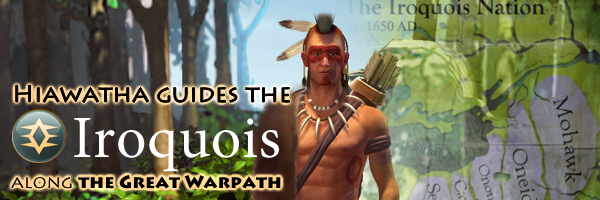
There's one civilization that I have not yet covered in my Brave New World strategies series that did receive an explicit rewrite of its unique national ability. I haven't covered them yet because that rewrite isn't so much a change to their ability, as it is really just a clarification that the ability applies to the new rules. The Iroquois civilization led by Chief Hiawatha has an ability that explicitly utilizes the expansion's trade route mechanics. The Iroquois are another civilization (like India) that receives a lot of hate from the Civ V gaming community due to some supposedly lackluster, highly-situational uniques. This strategy will focus on utilizing those uniques when they are beneficial, and on compensating for their downfalls and limitations.
Very little is known about the early history of Iroquoian people prior to the arrival of Europeans in the Americas. The Native American tribes had no written language, and their histories were passed down through oral tradition. According to that tradition, a great Peacemaker united the eastern Great Lakes tribes of the Mohawk, Oneida, Onandaga, Cayauga, and Seneca sometime between the 12th and 15th centuries. Other tribes would later join the confederacy, including some that were displaced from their native lands by European settlers. Iroquois culture was matrilineal, meaning that children were born into the mother's family, and women had a great deal of influence in the politics of the tribes. The Iroquois Confederacy utilized a representative system in which each tribe appointed a number of chiefs (based on relative population of the respective tribes) to serve on a council. There was both a council of male chiefs, and also a council of clan mothers that both had roughly equal authority.
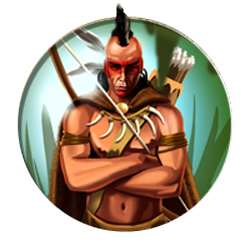
Hiawatha is a near-mythical figure in Iroquois history. He was a follower of the Great Peacemaker, who traveled between the various tribes of the region preaching a prophecy of a strong alliance uniting all the tribes of the Great Lakes region in peace. Hiawatha, along with the Peacemaker, effectively founded the Iroquois Confederacy using his skills as an orator (and, in some traditions, magic) to convince the various tribes to join. According to oral tradition, the Seneca resisted the alliance, leading to a confrontation that was stopped when the sun miraculously went dark, turning day into night. This supposed solar eclipse lead the Seneca to put down their arms and commit themselves to the alliance. [More]
070ae582-fddf-40f1-8379-9204a2c72f78|1|5.0
Tags:Sid Meier's Civilization, Civilization V: Brave New World, Civilization V: Gods & Kings, Civilization V, Iroquois, Hiawatha, Mohawk Warrior, Longhouse, Great Warpath, forest, jungle, food, deer, city connection, production, workshop, swordsman, Mohawk, Oneida, Onandaga, Cayauga, Seneca, Civ-V
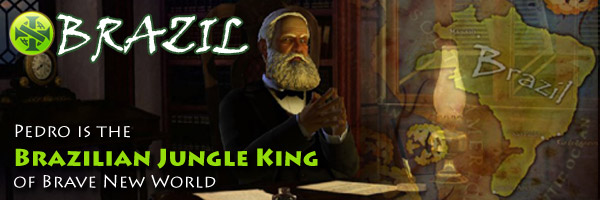
Part 2 in my series of Civilization V strategies is intended to help you dominate the world with your Brazilian Carnivals!
Brazil was established as a colony of Portugal during the era of European colonization. It was officially named "The Land of the Holy Cross", but traders often referred to it as "The Land of Brazil", after the "brazilwood" tree dye that was the most popular and profitable export from the region. After Napoleon of France invaded Portugal in 1807, the capital of that country was temporarily re-located from Lisbon to Rio De Janeiro in Brazil. The bulk of the country is tropical and contains the majority of the Amazon rain forest and Amazon river basin. Brazil is a relatively new nation, gaining its independence from Portugal in 1822 and eventually becoming the Federative Republic of Brazil later in the twentieth century. It is the largest country in South America (in terms of both land area and population) and is the largest country which retains Portuguese as its official language. Its culture is made up of unions between primarily-Catholic Western European culture and native tribal cultures of the Pre-Columbian era.
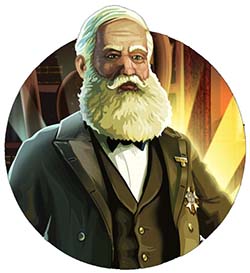
Pedro "the Magnanimous" II ruled the Empire of Brazil for 58 years. He took a country on the verge of dissolving and turned it into an economic, cultural, and educational powerhouse in the western hemisphere. He was incredibly popular due to his vigorous support of freedom of speech, abolition of slavery, and public education, and he presided over the armies of Brazil to victory in all three wars that the nation was involved with during his reign. He was eventually overthrown by a military coup despite being overwhelmingly popular both domestically and internationally. He accepted European exile due to his advanced age and disinterest in maintaining the constitutional monarchy. The country then went through a period of political and economic instability before re-emerging in the late 20th century.
Brazil is a top tourist destination in the world due to its vast swaths of unspoiled lands and natural beauty. Rio De Janeiro is a particularly popular hotspot for tourism due to its festive lifestyle and the presence of the Christo Redentor ("Christ the Redeemer") statue, which is widely regarded as one of the man-made wonders of the modern world. Tourism and culture, is thus, the focus of Brazil's play-style in Civilization V: Brave New World.
[More]
46de78b1-fedf-41f4-9969-43b9fa6fd9dd|7|4.7
Tags:Sid Meier's Civilization, Civilization V: Brave New World, Civilization V, Brazil, Pedro II, Pracinhas, Brazilwood Camp, Carnival, tourism, culture, jungle, religion, Catholicism, Cristo Redentor, golden age, Golden Age from Victories, unique improvement, infantry, Civ-V
|

| 12 | | | | | | | 60 | | 11 | | | | | | | 55 | | 10 | | | | | | | 50 | | 09 | | | | | | | 45 | | 08 | | | | | | | 40 | | 07 | | | | | | | 35 | | 06 | | | | | | | 30 | | 05 | | | | | | | 25 | | 04 | | | | | | | 20 | | 03 | | | | | | | 15 | | 02 | | | | | | | 10 | | 01 | | | | | | | 05 |
|